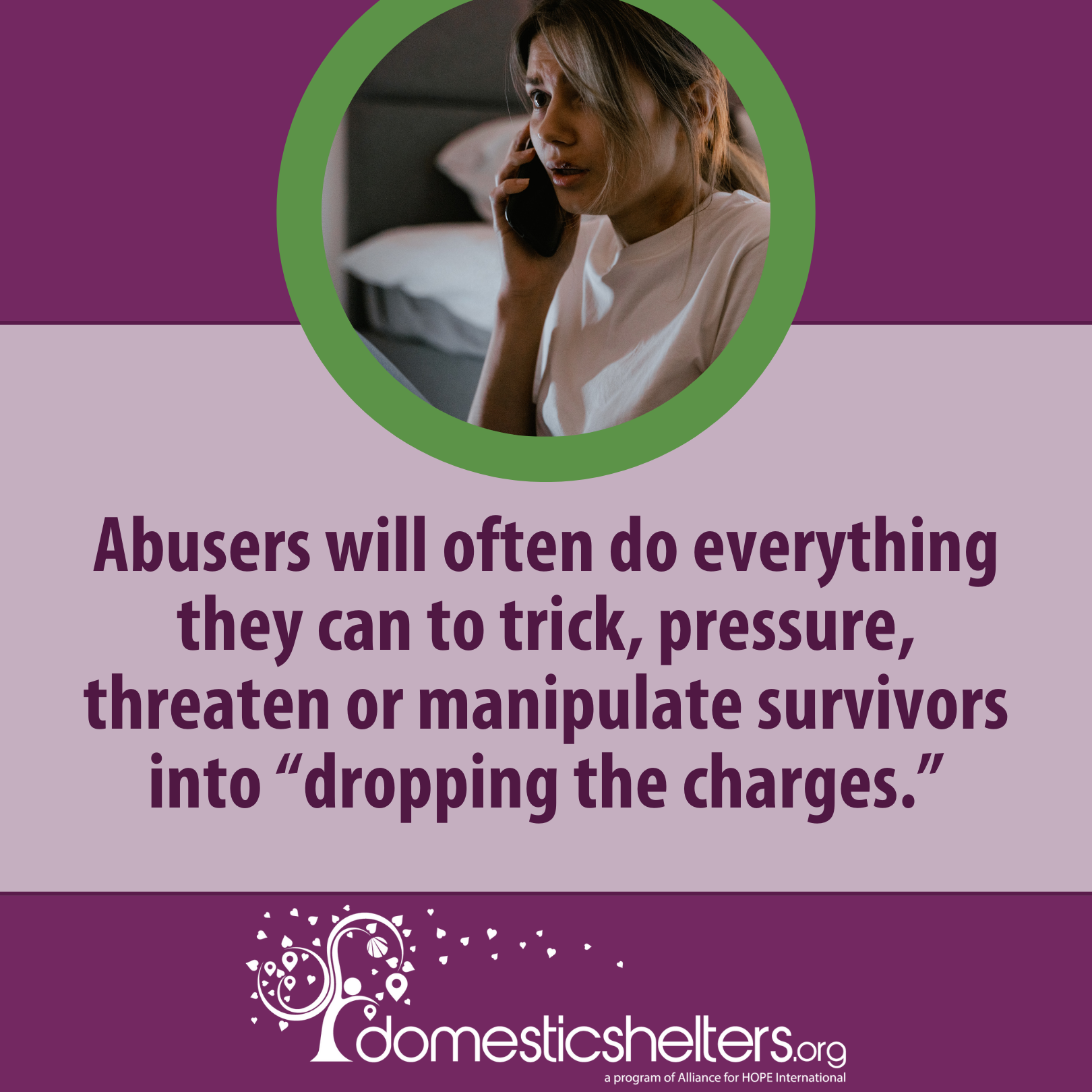By Shelley Flannery
Whether out of fear, courage or desperation, you’ve finally decided to call the police on an abuser. Good for you! We know what a difficult step that is to take. At most, only about 40 percent of domestic violence incidents are ever reported to law enforcement (and we’d be willing to bet the real number is actually quite a bit lower). Please take a moment to be proud of yourself!
Why do so many abusers get away with it? Many incidents of domestic violence are nonphysical and therefore, harder to prove as illegal. Many survivors fear they won’t be believed if they speak out while others have been threatened by an abuser if they do. Sometimes, staying silent is the only way a survivor feels she can stay alive.
On top of that, when a survivor does report, abusers don’t usually accept the charges quietly. Often, they will do everything they can to trick, pressure, threaten or manipulate survivors into “dropping the charges.”
What Does “Dropping Charges” Really Mean?
We say dropping the charges, but the person listed as the victim in a domestic violence case does not actually have the power to drop charges like they would in other types of criminal cases. It’s up to the prosecutor to decide whether or not domestic violence charges should be taken to court. This is important to know from the outset. If your abuser wants you to drop charges, make clear that you did not file the charges. Those decisions are made by prosecutors.
However, survivors can decide to reverse the statement they made to police (called recanting) or refuse to participate in the court process —all of which makes it infinitely more difficult for the prosecution to get a conviction. As such, the charges frequently end up getting dropped or reduced if the victim chooses not to participate in the court case.
And abusers know this.
Abusers’ Five-Step Survivor Manipulation Tactic
Abusers will do just about anything to get survivors to recant their statements. Frequently, they will play on survivors’ emotions to get them to feel sorry for the abuser and decide to recant. This happens so often that researchers decided to study the phenomenon and found a clear pattern of how abusers do it.
Researchers at The Ohio State University listened to recorded jailhouse phone calls between 17 men charged with felony domestic violence and their female partners—all of whom decided to “drop the charges”. The men were being held in a Washington state detention facility. About three hours of conversation between each couple was studied.
During these phone calls, the abusers minimized the abuse and emphasized their feelings of depression and loneliness to the survivors. In one instance, an abuser threatened suicide before the survivor promised to get him out of jail.
Most of the 17 phone calls happened in what the researchers deemed a five-step process; a process of which survivors should be aware. In this case, the study was done on male abusers, though these tactics may be used by either male or female abusers toward either male or female survivors. This study determined distinct stages to the manipulation process of the 17 males studied:
First Stage: An intense argument over what happened occurred, all the while the survivors willfully held their ground.
Second Stage: The abuser minimized his actions, maintaining he didn’t do anything severe enough to warrant a felony charge. A critical point happened here. The abusers all pleaded with their victims, telling them how depressed and lonely they were, and how much they missed the survivor and the children (where applicable). They took on the role of the victim and received sympathy from the survivors, who soothed and comforted them.
Third Stage: The two would tell each other how much they loved one another and how no one else understood their relationship. It was them against the world.
Fourth Stage: The abusers asked their victims to drop the charges.
Fifth Stage: The victims recanted their statements in each of the cases. Typically, at that point, the couple would go over specifically what each should say in court.

How to Stay Strong When An Abuser Pressures You
Well-trained and informed prosecutors should not be dismissing cases even if the victim is intimidated into not testifying against her abuser, according to Casey Gwinn, one of the leading trainers of prosecutors in the country. But if an abuser tries this manipulation tactic with you, stay strong and know it is just that—a tactic to try and get you to do what the abuser wants. Here are some tactics you can use to keep from falling for it.
Don’t Answer
Difficult as it may be, block the abuser’s number and don’t answer calls from unknown numbers. Almost all domestic violence arrests result in a no-contact order, so the abuser shouldn’t be contacting you anyway unless it pertains to shared children. In such cases, the abuser will be given strict guidelines for how they may contact you. Do not entertain any communication outside what’s necessary to care for your children.
Get an Advocate
Survivors who have the support of an advocate are much more likely to follow through with charges than those who don’t. Contact a local domestic violence advocate. An advocate can accompany you to court proceedings and counsel you on what to expect. Most Family Justice Centers and many community-based domestic violence organizations will assist survivors in court and often accompany them to court to testify.
Report Wrongdoing
Document every time the abuser violates the no-contact order. Report these incidents to police and the prosecutor. If the abuser ever threatens you into not testifying (a practice called witness tampering), report it. And make clear that you are not going to lie for your abuser in court.
Get Help From a Trauma Specialist
This is a critical time for you to escape violence. Seek out a mental health professional who is trained to treat domestic violence trauma and can help you develop coping techniques. This will help you to remain strong during what is often a retraumatizing process.
Think Carefully About Giving Them Another Chance
It’s important to note that many survivors may feel it’s safe to return to an abusive partner after they’re released from jail or complete a batterer intervention program. Many survivors want to have hope that things will change and that a healthy relationship can be established with this person. Advocates stress that it is only accountability and monitoring that change an abuser’s behavior. An abuser must understand there are consequences to their actions and take those consequences seriously. For more on this topic, read, “Will Domestic Abuse Happen Again?”
Original Article: https://www.domesticshelters.org/articles/identifying-abuse/how-abusers-trick-survivors-into-denying-abuse




